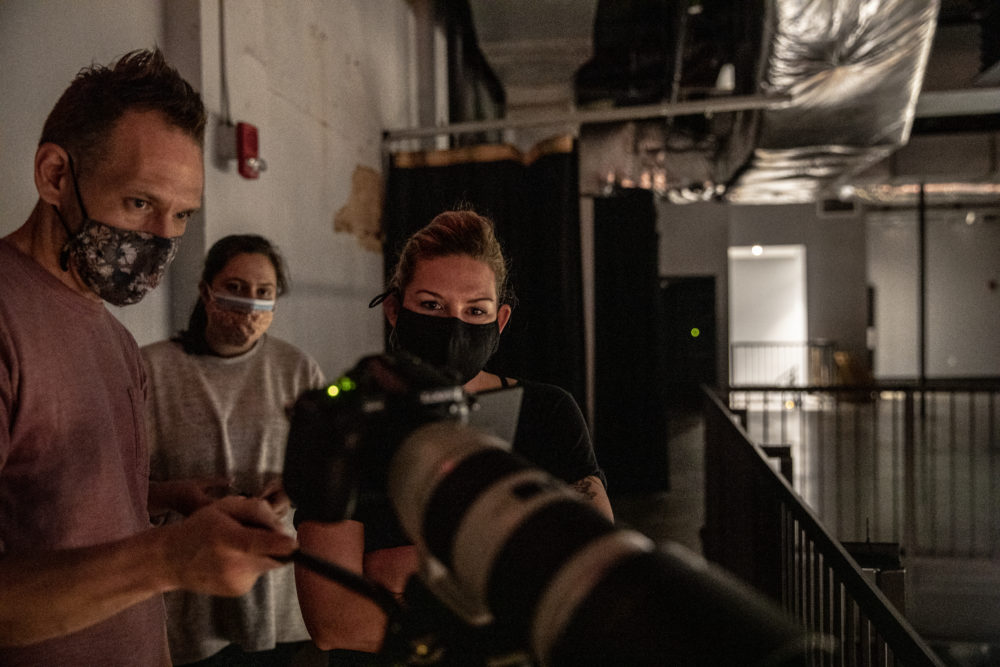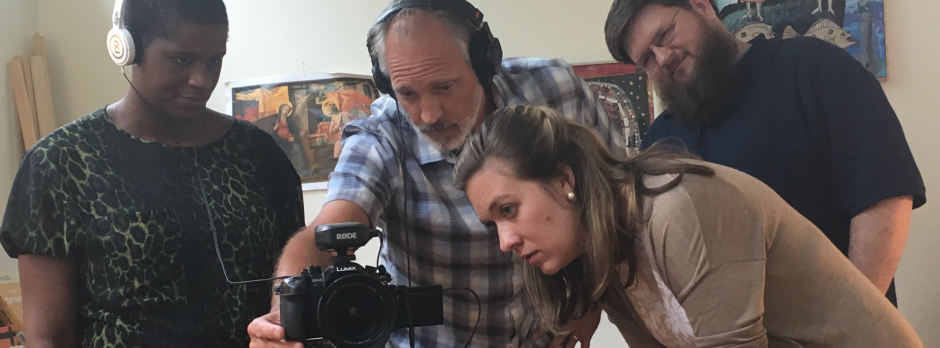MFA Program in Documentary Expression
About the Program
A Master of Fine Arts degree in Documentary Expression began in the fall of 2017 at the UM Center for the Study of Southern Culture. The MFA is a two-year (30-hour) graduate program that combines coursework in Southern Studies and interdisciplinary fields with advanced training in photography, film, and audio production.

Coursework in cultural studies paired with advanced training in production will enable students to tell compelling and nuanced stories of a complicated region and world.
The MFA program requires students to already have an MA degree in the humanities, social science, or journalism. The class entering in 2017 included students from a range of backgrounds, with MA degrees in Southern Studies, journalism, anthropology, and language study.
The Center for the Study of Southern Culture has a long history of engaging in documentary work, beginning with the Center’s founding in the 1970s by documentarian William Ferris, who explored southern culture through film and photography. Today, many of the Center’s interdisciplinary faculty use documentary methods in their own research and teaching, and undergraduate and graduate students have produced photography and a number of films and oral histories.
Faculty and staff at the Southern Documentary Project and the Southern Foodways Alliance play a major role in instructing and mentoring students in the MFA program.
For examples of the Center’s work, see the multimedia documentary website Mississippi Stories at mississippistories.org, the films of the Southern Documentary Project, and the films, podcasts and oral history work of the Southern Foodways Alliance.
To Apply
Students can apply through the University of Mississippi Graduate School website. The application deadline is February 1 for priority funding. We will waive the application fee for all prospective students who apply by the preferred deadline. Contact MFA Graduate Coordinator Melanie Ho with questions.
A completed application includes the following:
- completed electronic application through the UM Graduate School;
- transcripts from all previous institutions attended, sent directly from the institution to the UM Graduate School;
- two letters of recommendation;
- a writing sample;
- a portfolio that includes any previous documentary work the applicant would like to share with the admissions committee;
- and a 500-word statement of purpose that articulates why joining the program is the next and best step for the applicant.
- The personal statement should address the following questions: “Why is a degree in Documentary Expression from the Center for the Study of Southern Culture at the University of Mississippi the best next move for you? How will this degree program help you to achieve your personal and professional goals? What specifically appeals to you about the program?” We encourage applicants to briefly outline or describe a potential project.
*We do not require the GRE for admission into the MFA program.
The MFA Curriculum
The MFA in Documentary Expression requires 30 hours of coursework: 21 hours of content-based classes and 9 hours of thesis credit. MFA students must complete SST 601 (Graduate Seminar I), SST 533 (Fieldwork & Oral History), SST 610 (MFA Seminar), and SST 633 (MFA Fieldwork). They must also complete at least one of the following: SST 534 (Documentary Photography), SST 537 (Documenting the South in Film), or SST 538 (Advanced Documentary Film), plus three credit hours of SST 699 (MFA Critique). Students who enter the program with an MA in Southern Studies from UM may apply 6 hours of that degree for SST 533, 534, 537, 538, or 601 but they may not repeat classes taken for credit while earning the MA.
Students may begin taking thesis hours upon arrival, provided that the Admissions Committee finds their project idea to be sufficiently developed. MFA students complete a written prospectus (12-15 pages, plus bibliography) and have it approved by their three-person supervisory committee by the end of their second semester in the program. Final projects may take the form of still photography, film, oral history, audio recordings, or some combination thereof, plus a written component, approximately 50-75 pages in length, that both addresses the writer’s process and situates his or her project within relevant scholarly discourse. As with the MA, students pass an oral defense in order to complete the degree.
View the complete handbook here.
QUICK LINKs RESOURCE
course description for grad-level courses
533 Fieldwork and Oral History: Analysis of fieldwork techniques and examination of the contemporary South through oral history.
534 Documentary Photography: An exploration of the contemporary South through documentary photography.
535 Anthropological Films: This course introduces students to visual and virtual anthropology, subfields that bridge the humanities and social sciences to document and analyze social interactions, human behavior, and cultural life through audiovisual arts and media production. Graduate work will emphasize study of the American South.
597, 598, 599 Special Topics: Interdisciplinary study of specialized topics in Southern culture. May be repeated once if the topic varies.
536 The Southern Environment: This course will look at the ways the Southern Environment has been discussed in scholarship, literature, film, music, art, and other ways that we uncover together. As part of a broader environmental history survey we will spend a good bit of time discussing place and space in the South. I expect you to reflect on your personal sense of place in classroom discussion, written assignments, and your class project. We will also put the Southern Environment into context by looking at comparative works.
537 Documenting the South in Film: (Prerequisite is SST 533) This combines the philosophy and ethical responsibilities of documentary work with the technical aspects of film making. The course incorporates reading assignments and films to establish a well-rounded foundation, while students will also be trained in shot composition, lighting, and audio for film.
538 Advanced Documentary Film: (Prerequisite is SST 537) This course is a one-semester production workshop building on skills learned in SST 537, Documenting the South in Film. Goals include developing advanced documentary practices and completing several assignments intended to illustrate these practices in documentary filmmaking.
555 Foodways and Southern Culture: This class explores questions about ownership and access; inclusion and exclusion; and what it means to grow, cook and eat in the 21st century South. Themes include: the region’s culinary history—considering the crucial importance of climate and both voluntary and involuntary migration for shaping southern food, the trenchant but evolving relationship between food and regional identity, labor in the southern food system, the various “imaginaries” that circulate around and through southern food, and the ways in which food can (and cannot) be understood as indicative of a changing South.
556 Cultural Heritage Tourism: A multidisciplinary seminar for students who wish to employ theoretical and practical approaches to examining the movements of heritage site tourists within Southern regional spaces. The class gives special attention to issues of power and politics.
560 Oral History of Southern Social Movements: In this course, you will learn the basics of oral history methodology in historical scholarship. Our focus will be on recent social movements in the South and how they have shaped society and individual lives. Students will become familiar with interdisciplinary scholarship on oral history and learn the historiography that intersects with their project. They will learn to design an oral history project, conduct and transcribe oral history interviews, interpret oral history evidence, assess that evidence in relationship to published and archival records, and use and contribute to a university archive or community history project. This process will demand and strengthen a wide range of skills: active listening, close reading, analytic thinking, self-awareness, and teamwork. Beyond that, it will ask you to develop responsible, respectful, and mutually productive relationships with people outside the campus and to conduct your work in such a way that it will be of value to other scholars and to the people who share their stories with you. Finally, students will work in teams to create a documentary project that will be exhibited late in the semester.
601 Graduate Seminar I: Multidisciplinary reading and research seminar in Southern Studies. Students will read and discuss a common core of readings while pursuing research in their individual areas of interest.
602 Graduate Seminar II: Reading, discussion, and research and writing course focused on exploring various perspectives on Southern society, its development and its institutions, social classes, and ethnic and racial groups. Outcome of this course is typically a thesis or internship proposal.
610 MFA Seminar: This course is an advanced survey of the innovations and shifts across the historical arc of documentary storytelling. Students examine how those shifts continue to redefine the medium and make room for new genres under the “documentary” umbrella. They will study the formal and theoretical evolutions of documentary through history, as well as an exploration of the media, materials, and technologies that informed those changes.
612 Globalization and the U.S. South: This is an interdisciplinary course about globalization in the American South with an emphasis on migration. We will be examining the global interconnections that link people and nations economically, politically, and culturally to understand how powerful global forces are shaping local realities and conditions in a variety of southern states. Additionally, we will look at the historical antecedents to the current phase of globalization to examine longer historical connections, similarities, and differences between past global exchanges and the most current forms. Each week’s readings will evoke a series of critical questions about place-specific politics, social experiences, and economic relationships in the global South.
633 MFA Fieldwork: (Prerequisite is SST 533) This class exposes students to multiple forms of fieldwork (video, audio, and printed photography) and to practitioners of various kinds of documentary work, encouraging them to produce by semester’s end a project that utilizes skills in at least one of the approaches to which they have been exposed.
699 MFA Workshop: This class functions as a workshop in which students share documentary works in progress and receive feedback from their cohort and from faculty. Students present ongoing project at multiple points in the semester and reflect on both the content of their work and the process involved in its production.
*Courses outside Southern Studies can be added with approval
Apply to the University of Mississippi Graduate SchooL

